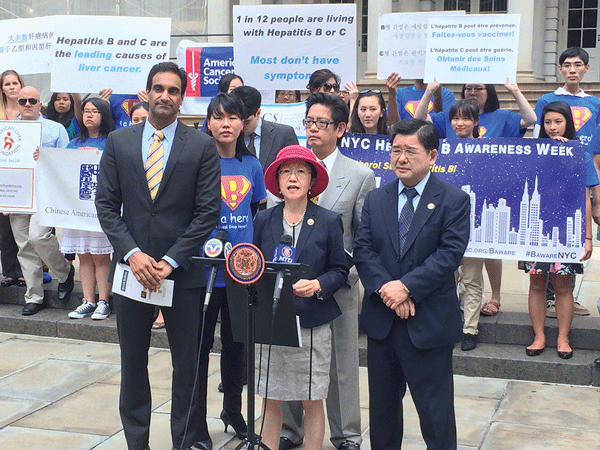
BY PAUL SCHINDLER | Three City Council members who have focused particular attention on the risks of hepatitis B and C joined city health officials and leading healthcare providers in marking the start of New York’s first Hepatitis B Awareness Week.
The July 21 gathering on the steps of City Hall included Health Committee Chair Corey Johnson, an out gay councilman from Manhattan’s West Side, Councilwoman Margaret Chin, who represents Lower Manhattan, including Chinatown, and Councilman Peter Koo, whose Queens district centers on Flushing.
According to the Centers for Disease Control and Prevention, although Asian and Pacific Islanders (APIs) make up less than five percent of the US population, they account for half of all Americans living with chronic hepatitis B. More than two-thirds of the API population were born or have parents born in countries with high prevalence of hepatitis B, and most of those infected had exposure as a young child. An estimated one in 12 APIs has chronic hepatitis B infection.
Among gay and bisexual men, hepatitis B is typically a sexually transmitted disease, and men who have sex with men make up about one fifth of new hepatitis B infections, according to the CDC. Hepatitis C has, in recent years, been identified as a co-infection among people who are HIV-positive.
Hepatitis is associated with a variety of severe liver diseases including cancer.
In June, the Council passed and Mayor Bill de Blasio signed legislation that provided $750,000 in new funding for community-based groups that do outreach and testing for hepatitis B and C. Grant recipients included a variety of service providers in communities particularly affected, such as the API and African immigrant population, and also LGBT and AIDS groups, including Harlem United, AIDS Center of Queens County, Housing Works, and VOCAL-NY, and a variety of harm reduction programs that work with injection drug users.
In February, Chin, Johnson and Koo introduced legislation that would require the health department to report annually to the Council and the mayor on its efforts to stop the spread of hepatitis B and C, which affects an estimated 250,000 to 500,000 city residents. Johnson’s Health Committee held hearings on the bill in June, with strong support from its members, though the health department testified that complying with such a law could cost between $1 million and $1.5 million annually.
The measure’s advocates believe that the de Blasio administration’s support for the $750,000 testing initiative indicates a likelihood that the mayor and the Council can see eye to eye on moving the reporting bill this fall.































